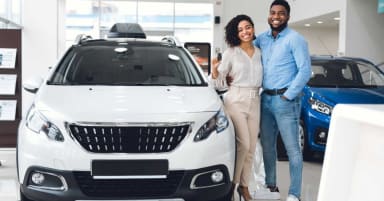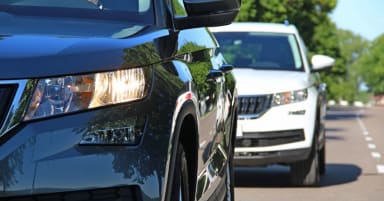Yes, you car insurance without a license and you have four main ways to do it. The fastest and cheapest way to get car insurance is to apply for a drivers license but if you don't have one, these are your options and how they work:
Can You Get Car Insurance With No License?
Getting car insurance without a license is possible but requires calling insurers directly since online applications won't work. This guide explains how you can get car insurance without a license, which companies will cover you, and how much it will cost.
Find out how to get auto insurance without a drivers license below.

Updated: January 29, 2026
Advertising & Editorial Disclosure
You Can Get Car Insurance Without a License: Your Options
- 1List a Licensed Driver as Primary (Most Common)
You own the car but someone else (spouse, family member, caregiver) drives it. They're the primary driver, you're the owner. You request to be an excluded driver (you won't be covered if you drive and won't legally be able to drive.
- 2Suspended License
Your license is temporarily suspended, but you still own a car. You need insurance to qualify for reinstatement in most states. The insurance company files an SR-22 form (certificate of financial responsibility) with your state. See our detailed guide to how to get car insurance with a suspended license.
- 3Parked Car Coverage
You own a car but it won't be driven (stored, collectible, seasonal use). Covers theft, vandalism, weather damage, and fire, but not accidents. It costs 40-60% less than standard full coverage car insurance.
- 4Learner's Permit Holder
You have a learner's permit and are working toward your full license. Get added to a parent's or guardian's existing policy instead of buying separate coverage. You can only drive with a licensed adult as required by your permit.
- 5International Driver
You have a valid driver's license from your home country but not a U.S. license. Many insurance companies accept foreign driver's licenses, passports, state ID cards, or Mexican consular ID as valid identification to insure your vehicle.
You don't need to list another primary driver on the policy, but insurance companies will treat you as a new driver regardless of your foreign driving experience and may charge more since they can't access your driving history. State Farm, Progressive, and Travelers are most willing to insure international drivers.
How to Get Car Insurance Without a License
Here are the steps you need to take and requirements to get car insurance without a license:
- 1Call Insurance Companies Directly
Don't apply online. Online tools require a driver's license number and will reject you. Call the insurance company directly. Tell them right away you don't have a license and explain which option applies to you (suspended, parked car, etc.). Ask if they offer coverage for your situation. Get a quote while you have them on the phone. Call at least 3 companies to compare.
- 2Documents You'll Need to Get Auto Insurance Without A License
Have these ready when you call:
- Your state-issued ID card, passport, or valid home country driver's license
- Social Security number
- Vehicle VIN and proof of ownership (title or registration)
- If someone else drives: Their valid driver's license number and personal information
- If suspended license: Court papers or suspension documents
- If learner's permit: Copy of your permit
- If international driver: International Driving Permit
Companies Offering Car Insurance Without a License
Most major insurance companies will insure a car if you list a licensed driver as the primary driver. If your situation is different (you have a suspended license and need SR-22 filing, or you're insuring a parked car), call ahead to confirm the company can handle it. Here are companies known for working with unlicensed drivers:
Insures unlicensed drivers in all 50 states. Handles SR-22 filings for suspended licenses. Specializes in parked car coverage. Must speak with an agent—online applications won't work. Call: 1-800-841-3000
Accepts unlicensed drivers with flexible coverage options. Handles SR-22 and FR-44 filings for suspended licenses. Ask about parked car coverage options. Call: 1-866-749-7436
Works with unlicensed drivers, especially families with learner's permit holders. Discuss excluded driver options and license reinstatement support with local agents. Call to ask about parked car coverage. Find a local agent on their website.
Options if you are denied for car insurance without a license: Acceptance Insurance focuses on drivers other companies won't cover. Direct Auto specializes in high-risk drivers and non-standard situations. Commonwealth and Advantage Auto accept state-issued ID cards for unlicensed drivers.
Most Affordable Car Insurance Without a License?
Progressive, GEICO and Travelers offer the lowest car insurance rates for drivers without a license. Here are the cheapest insurers for each type of insurance with no license:
- No license but a primary driver listed: GEICO is cheapest at $43 per month (36% below national average ) for liability only and Travelers is cheapest at $97 per month on average (29% below national average), GEICO at $98 per month.
- Parked car (comprehensive only): GEICO has the lowest rates at $40 to $75 per month.
- Suspended license with SR-22: Progressive has the cheapest rates ranging from $100 to $250 per month and the SR-22 filing fee adds $15 to $50 one-time.
- Teen drivers with learner's permit added to parent's policy: GEICO and State Farm are the cheapest options for most family. See our guide to affordable rates for teen drivers to find the best option.
It can be tricky to get car insurance without a license. We help you compare quotes and connect with an insurer to get covered.
Insurance for No Driver's License: FAQ
Below, MoneyGeek's experts answered common questions about car insurance without a license.
What happens if I drive without a license?
Driving without a valid license is illegal. Insurance won't cover you. You face fines, penalties, and possible jail time. You'll be personally responsible for all accident costs—even if your vehicle is insured. Don't risk it.
Why do insurance companies ask for a license?
They need your driving history to set your rates. Your license number helps them look up accidents, violations, and claims. Without a license, they can't review your history, which makes you higher risk. You'll pay more and have a harder time getting approved.
Do Drivers Without a License Need Non Owners Car Insurance?
Some drivers without a license think they need non owners car insurance. But non owners car insurance is for when you have a valid driver's license but don't own a car and you frequently borrow or rent cars. This covers you when you drive other people's vehicles. Since you need a license for non-owner policies, this doesn't apply to people getting insurance without a license.
Car Insurance With No License: Our Methodology
We contacted insurance companies directly to identify which provide coverage for unlicensed drivers and calculated rates using a standard profile: a 40-year-old with a 2010 Toyota Camry LE, 12,000 annual miles and 100/300/100 coverage with a $1,000 deductible. Our analysis draws from 83,056 quotes across 46 insurers in 473 ZIP codes, sourced from Quadrant Information Services and state insurance departments, then verified through direct insurer contact for unlicensed driver policies. We evaluated companies based on their willingness to insure unlicensed drivers, coverage options, application processes and geographic availability, adjusting our profile for suspended licenses, permit holders and first-time applicants. Read more about our methodology here.
Auto Insurance Without a License: Related Articles
About Mark Fitzpatrick

Mark Fitzpatrick, a Licensed Property and Casualty Insurance Producer, is MoneyGeek's resident Personal Finance Expert. He has analyzed the insurance market for over five years, conducting original research for insurance shoppers. His insights have been featured in CNBC, NBC News and Mashable.
Fitzpatrick holds a master’s degree in economics and international relations from Johns Hopkins University and a bachelor’s degree from Boston College. He's also a five-time Jeopardy champion!
He writes about economics and insurance, breaking down complex topics so people know what they're buying.
sources
- Independent Insurance Agents & Brokers of America. "Homepage." Accessed January 23, 2026.
- New Jersey Motor Vehicle Commission. "Moving to New Jersey." Accessed January 23, 2026.
- New York State Department of Motor Vehicles. "Resources for Non-US citizens." Accessed January 23, 2026.













